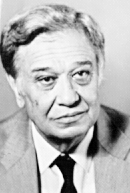|
|


(1923-2003)
|
Professor Todor Krumov Nikolov, MD, PhD
(8.05.1923 - 19.02.2003)
Distinguished scientist and teacher of generations of Bulgarian biochemists;
Professor of Biochemistry, founder of the Department of Biochemistry, Faculty of Biology, The University of Sofia “St. Kliment Ohridski”;
Author of the chapters “The cell – fundamental unit of life”, “Integration of metabolism” and “Biochemistry of nutrition” in the textbook “BIOCHEMISTRY IN INTERNET. LECTURES ON BIOCHEMISTRY”, 2004 and 2010;
Scientific editor of the first paper edition of the book “BIOCHEMISTRY TESTS”, 1999.
ã.
|
Professor Nikolov has graduated in medicine and chemistry from the University of Sofia (US). In 1965 he founded the Department of Biochemistry in the Faculty of Biology and was Head of the Department of many years’ standing, at the same time being Head of the Department of Biochemistry, Faculty of Medicine, Medical University of Sofia (MUS). Together with his research and teaching work Prof. Nikolov held high academic posts and took an active part in the work of a number of scientific institutes. He has been a Dean of the Faculty of Biology, Vice-Rector of the University of Sofia, Director of the Biotechnology Center in SU, Head of the Enzymology Section in the Institute of Molecular Biology of the Bulgarian Academy of Sciences, consultant in the World Health Organization, President of the Biochemistry Section of the Union of Scientists in Bulgaria, Representative of Bulgaria in the Federation of the European Biochemical Societies.
Prof. Nikolov laid the basis of advanced training in the field of Biochemistry as well as in the different branches of Molecular Biology and Biotechnology. He is the author of the first Bulgarian textbook on GENERAL BIOCHEMISTRY. A brilliant scientist and teacher, Professor Nikolov has an exceptional contribution to the sustained excellence of the Biochemistry graduates of SU and MUS, as well as their acknowledgment in our country and abroad. He has great merits for the integration of the Bulgarian biochemistry into the world science. He set an example to us, his students and colleagues, thus stimulating us to make greater efforts and to acquire a spirit of democracy combined with a sense of responsibility, to strive for creativity and high criteria of science and teaching.
|
|
|

